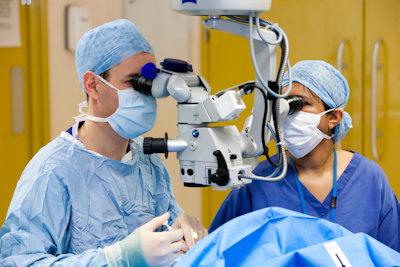What to Expect After Cataract Surgery?
If you are considering having cataract surgery but wonder what to expect after the procedure and how long it may take to recover, Elmquist Eye Group can help.
Dr. Yasaira Rodriguez, MD is a board certified ophthalmologist and refractive surgeon who specializes in refractive laser-assisted cataract surgery and eyelid surgery.
 Managing partner, Kate Wagner, OD, and associate, Nina Burt, OD, are board certified optometrists.
Managing partner, Kate Wagner, OD, and associate, Nina Burt, OD, are board certified optometrists.
How Do Cataracts Occur?
A cataract occurs when the normally clear lens of your eye gets cloudy. It can develop in one or both eyes but does not spread from one eye to the other. Most of the time, the condition develops in older individuals. According to the National Eye Institute, however, more than 24.5 million Americans over the age of 40 are affected by them.
While most cataracts are age-related, cataracts also occur in babies (called congenital cataracts). And they can be caused by a traumatic eye injury, by excessive exposure to ultraviolet light, by the use of certain medications, including prednisone and corticosteroids, and by certain diseases, such as diabetes.
How are Cataracts Treated?
Cataracts cannot be treated with medicines, vitamins or eye drops. Surgery is the only proven treatment. During cataract surgery, the clouded lens is removed and replaced with a customized, artificial lens called an intraocular lens (IOL).
Cataract surgery is one of the safest and most highly perfected surgical procedures in medicine, with a 95% success rate. Of course, as with any surgery, risks do exist and should be discussed with Dr. Rodriguez before the procedure.
What to Expect After Surgery
Many patients report clear vision within a few hours of cataract surgery and are amazed by the clarity and the brightness of colors. But each person heals differently, so don’t be alarmed if your vision is a bit cloudy or blurry. It may take a week or two before you see images in their sharpest focus.
In general, you should be able to watch TV, do some light computer work, and shower or bathe within a few hours of your surgery.
Typically, your surgeon will schedule a follow-up appointment with you on the day after your procedure to ensure there are no complications. If you feel discomfort or don’t notice any improvement in your blurry vision in the days following this appointment, be sure to report the situation to the surgeon.
Recovery following cataract surgery should be complete in about a month, when your eye is completely healed.
Learn more about what to expect after cataract surgery by calling Elmquist Eye Group at (239) 936-2020. We welcome your questions and will do our best to provide accurate answers.
